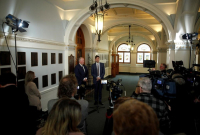Support strong Canadian climate journalism for 2025
The federal government has announced $10 million to help the RCMP prosecute money laundering after a special meeting of Canada's finance and justice ministers to discuss the pervasive problem.
British Columbia has been pushing for nationwide action and while its finance minister said the funding falls short, she stressed it was crucial that other provinces join the effort.
"Criminals don't know boundaries. They don't know provincial borders," said Carole James on Thursday. "If we close loopholes here, we know that dirty money will be looking for another opportunity."
Federal Finance Minister Bill Morneau and Organized Crime Reduction Minister Bill Blair also attended the meeting. Alberta and Saskatchewan were the only provinces that did not participate.
James said it should be no surprise that B.C. will continue to push for more money for enforcement. A recent report found the federal RCMP team responsible for money laundering only had five officers in the province.
"We certainly are doing everything we can to share data," she said. "But the information is only as good as the people who will move it ahead with criminal investigations and get the prosecutions done."
Morneau said the new funds will help co-ordinate information so the RCMP can hold criminals accountable.
The government dedicated "significant" funding of about $160 million in its 2019 budget toward understanding how money laundering is happening in Canada, Morneau added.
He said the ministers discussed making corporate ownership of real estate more transparent, with provinces including Ontario and Manitoba agreeing that beneficial ownership needed to be less opaque.
B.C. has introduced legislation to establish a beneficial ownership registry that is expected to be operational in 2020. The Ontario Real Estate Association has called for its provincial government to do the same.
Asked why Ottawa cannot urgently create a framework for provinces to establish such registries, Morneau said there are issues around privacy and the burden of regulations on corporations. But he said he heard Thursday that everyone was willing to take next steps.
He also said ministers discussed gaps in the system and the need to include lawyers in the fight against money laundering. The federal government is working with the Federation of Law Societies, he said.
Lawyers don't have to report to Canada's anti-money laundering agency, the Financial Transactions and Reports Analysis Centre of Canada, or FINTRAC.
Blair said lawyer-client privilege is a long-standing and useful principle, but the federal government is working with law societies to find ways to ensure there is appropriate oversight.
Eby stressed that FINTRAC's limitations go even further. A number of sectors don't have to report to the agency, including luxury cars and post-secondary schools, and even when other sectors file reports they can't be sure the centre will investigate, he said.
Apart from than the new RCMP funding, the ministers emerged from the meeting without anything firm to announce.
Blair said he was encouraged by the commitments of Manitoba, Nova Scotia and others to work together.
"Organized crime is motivated entirely by profit. By working together, we can take that profit away from them. By doing that, we make all our communities safer," he said.
B.C. called a public inquiry into money laundering last month after two reports shed new light on the issue. One report estimated $7.4 billion in dirty money was washed in B.C. last year, but it also suggested Alberta, Ontario, Saskatchewan and Manitoba have a worse problem.
Ontario's Finance Minister Vic Fedeli wrote to Morneau this week to request federal money on par with B.C. to fund anti-money laundering initiatives. Fedeli said he was concerned that the bulk of the money in the federal budget would go toward B.C.
Blair said the ministers didn't discuss specific allocation of resources at the meeting. The federal government has boosted funding for the Canada Border Services Agency, RCMP, Canada Revenue Agency and FINTRAC to strengthen the response to money laundering, he said.
Eby said he was "heartened" to hear Ontario's request for funding and he hopes the province also moves forward with legislative reforms including creating a beneficial ownership registry.





Comments
In this same edition of National Observer there is the story of the failure of UPAC in Quebec. Much the same conditions that have plagued this lengthy investigation and prosecution will also plague the RCMP and waste taxpayer money if the provincial and federal Ministers do not learn from the UPAC problem and accept that skilled, forensic and financial experts must be an integral part of the probe. Organized crime is notorious for employing the smartest, most skilled and best connected professional help they can lure with lucrative rewards. To counter this the forces of criminal justice will have to stop penny pinching and send in the experts required. There may well be some very smart people in the RCMP - but few of them have ever had the opportunity to get the education and training to deal with international financial criminality. If we are serious about ending this scourge, we'd better put serious money into the effort.